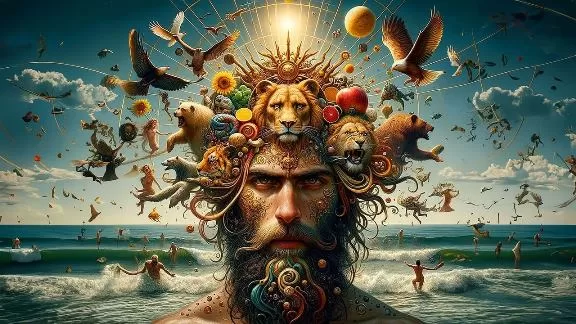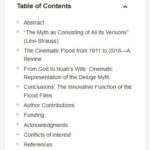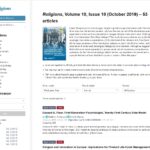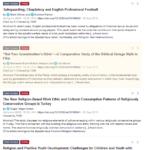In this comparative study, we’ve surveyed Hollywood films that present the deluge iver the last century – in each of them the humanity is presented as facing annihilation, while offering an a current critic. Recently, for instance, the deluge myth is linked to the ecological discourse.
The article (about 10500 words) got published in the Swiss journal Religions, a top journal in the study of religions. Over the years it has firmly maintained its Q1 SJR ranking, in the Religious Studies category.
Another article by Marianna Ruah-midbar and Lila Moore deal with this movie, and one more article by them is dedicated to the deluge theme in cinema. See links below.
The main headlines of the article:
“The Myth as Consisting of All Its Versions” (Lévi-Strauss)
The Cinematic Flood from 1911 to 2018—A Review
From God to Noah’s Wife: Cinematic Representation of the Deluge Myth
Conclusions: The Innovative Function of the Flood Films
List of films mentioned and analyzed in the article:
1. The Deluge (1911, director’s name unknown)
2. Noah’s Ark (1928, Michael Curtiz)
3. The Deluge (1933, Felix E. Feist)
4. The Bible: In the Beginning (1966, John Houston)
5. Deep Impact (1998, Mimi Leder)
6. Sky Captain (2004, Kerry Conran)
7. Evan Almighty (2007, Tom Shadyac)
8. The Day the Earth Stood Still (2008, Scott Derrickson)
9. 2012 (2009, Roland Emmerich)
10. 40 Days and Nights (2012, Peter Geiger)
11. The Humanity Bureau (2014, Robert W. Kings)
12. Noah (2014, Darren Aronofsky)
13. The 100 (2014 – ongoing, TV Netflix Series)
14. The Salvation (2017 – ongoing, TV series)
In two other articles, Marianna Ruah-Midbar and Lila Moore analyzed specifically the film Noah (presented as number 12 within the list above). See links below.
Abstract
The biblical story of the Flood, which portrays a humanity worthy of annihilation, is the fundamental myth used by generations of interpreters as they radically criticized the society and culture in which they lived. Accordingly, the Deluge myth’s various versions and interpretations over the years mirror ever-changing cultural dilemmas and values.
Our comparative–historic study observes this mirror and how changes in modern Western culture are reflected in it through the analysis of selected films. It exemplifies the representation and evolution of the Deluge myth in cinema from its inception to the present day, and demonstrates that the myth’s cinematic adaptation and its infusion with current interpretations turn it into an imminent apocalyptic threat. Apparently, the Flood becomes a relevant concern involving a wide scope of cultural, theological, and ethical issues, e.g., the problem of evil, ecology, the treatment of animals, family values, feminism, the Other, and deification of science and technology.
Authors
Marianna Ruah-Midbar Shapiro
Lila Moore
Links
For the website of the journal Religions – click here.
For the page of the article on the journal’s website (containing the article in html format) – click here.
For 10.10 volume of the journal, with the content of the articles – click here.
Date
October 2019
Language
English
Academic/Non-academic
Academic item
Bibliographical citation
Ruah-Midbar Shapiro, Marianna, and Lila Moore, “‘Not Your Grandmother’s Bible’ – A Comparative Study of the Biblical Deluge Myth in Film”, in Religions 10.10 (2019), 542 [17 pages].











